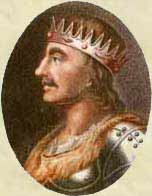Топик: BRITISH MONARCHY AND ITS INFLUENCE UPON GOVERNMENTAL INSTITUTIONS
![]()
![]() (899–924)
(899–924)
![]()
![]()
![]() ATHELSTAN
ATHELSTAN
(924–939)
![]() Elgiva = EDMUND I EDRED (939–946) (946–955)
Elgiva = EDMUND I EDRED (939–946) (946–955)
EDWY Ethelfleda = EDGAR = Elfrida, dau. of Ordgar, Ealdorman of East Anglia
(955–959) dau. of (959–975)
![]() Ealdorman
Ealdorman
Ordmaer
EDWARD THE MARTYR
(975–979)
Elfgifu = ETHELRED II THE UNREADY = Emma
![]() (979–1016) (later
(979–1016) (later
![]() (deposed 1013/14) married
(deposed 1013/14) married
CANUTE )
![]()
![]()
![]() EDMUND II IRONSIDE
EDMUND II IRONSIDE
(Apr.–Nov.1016)
Godwin = Gytha
![]()
![]()
![]()
EDWARD THE = Eadgyth HAROLD II
CONFESSOR (Edith) (Jan.–Oct.1066)
(1042–1066)
 EGBERT (802-39 AD)
EGBERT (802-39 AD) ![]()
Known as the first King of All England, he was forced into exile at the court of Charlemagne, by the powerful Offa, King of Mercia. Egbert returned to England in 802 and was recognized as king of Wessex. He defeated the rival Mercians at the battle of Ellendun in 825. In 829, the Northumbrians accepted his overlordship and he was proclaimed "Bretwalda" or sole ruler of Britain.
ÆTHELWULF (839-55 AD)
![]() Æthelwulf was the son of Egbert and a sub-king of Kent. He assumed the throne of Wessex upon his father's death in 839. His reign is characterized by the usual Viking invasions and repulsions common to all English rulers of the time, but the making of war was not his chief claim to fame. Æthelwulf is remembered, however dimly, as a highly religious man who cared about the establishment and preservation of the church. He was also a wealthy man and controlled vast resources. Out of these resources, he gave generously, to Rome and to religious houses that were in need.
Æthelwulf was the son of Egbert and a sub-king of Kent. He assumed the throne of Wessex upon his father's death in 839. His reign is characterized by the usual Viking invasions and repulsions common to all English rulers of the time, but the making of war was not his chief claim to fame. Æthelwulf is remembered, however dimly, as a highly religious man who cared about the establishment and preservation of the church. He was also a wealthy man and controlled vast resources. Out of these resources, he gave generously, to Rome and to religious houses that were in need.
He was an only child, but had fathered five sons, by his first wife, Osburga. He recognized that there could be difficulties with contention over the succession. He devised a scheme which would guarantee (insofar as it was possible to do so) that each child would have his turn on the throne without having to worry about rival claims from his siblings. Æthelwulf provided that the oldest living child would succeed to the throne and would control all the resources of the crown, without having them divided among the others, so that he would have adequate resources to rule. That he was able to provide for the continuation of his dynasty is a matter of record, but he was not able to guarantee familial harmony with his plan. This is proved by what we know of the foul plottings of his son, Æthelbald, while Æthelwulf was on pilgrimage to Rome in 855.
Æthelwulf was a wise and capable ruler, whose vision made possible the beneficial reign of his youngest son, Alfred the Great.
ÆTHELBALD (855-8 (subking), 858-60)
While his father, Æthelwulf, was on pilgrimage to Rome in 855, Æthelbald plotted with the Bishop of Sherbourne and the ealdorman of Somerset against him. The specific details of the plot are unknown, but upon his return from Rome, Æthelwulf found his direct authority limited to the sub-kingdom of Kent, while Æthelbald controlled Wessex.
Æthelwulf died in 858, and full control passed to Æthelbald. Perhaps Æthelbald's premature power grab was occasioned by impatience, or greed, or lack of confidence in his father's succession plans. Whatever the case, he did not live long to enjoy it. He died in 860, passing the throne to his brother, Æthelbert, just as Æthelwulf had planned.
ÆTHELBERT (860-66 AD)
![]() Very little is known about Æthelbert, who took his rightful place in the line of succession to the throne of Wessex at around 30 years of age. Like all other rulers of his day, he had to contend with Viking raids on his territories and even had to battle them in his capital city of Winchester. Apparently, his military leadership was adequate, since, on this occasion, the Vikings were cut off on their retreat to the coast and were slaughtered, according to a contemporary source, in a "bloody battle."
Very little is known about Æthelbert, who took his rightful place in the line of succession to the throne of Wessex at around 30 years of age. Like all other rulers of his day, he had to contend with Viking raids on his territories and even had to battle them in his capital city of Winchester. Apparently, his military leadership was adequate, since, on this occasion, the Vikings were cut off on their retreat to the coast and were slaughtered, according to a contemporary source, in a "bloody battle."
ÆTHELRED I (866-71 AD)